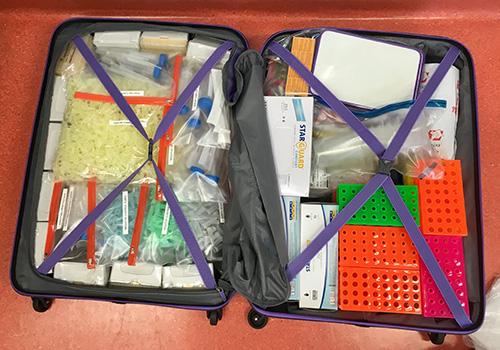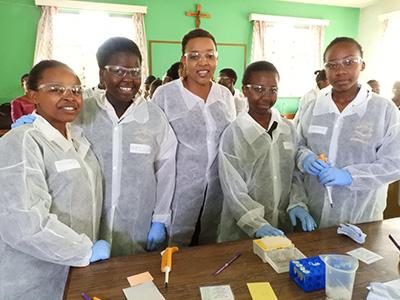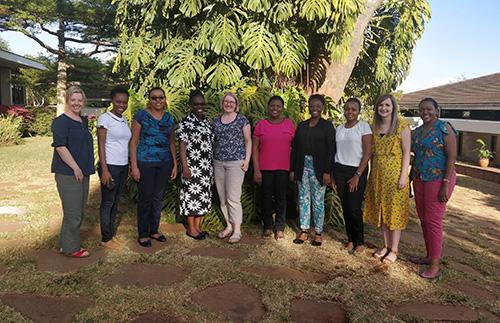Inspiring future women scientists in Africa
The Roslin public engagement team went to Kenya to train scientists to engage school girls with science.

The African Schools Outreach Programme of the International Veterinary Vaccinology Network (IVVN), a vaccine network based at The Roslin Institute, provides scientists working in veterinary vaccinology across Africa with the training and resources to host workshops at schools in their countries and inspire pupils to be the next generation of scientists.
Women make up, on average, just 24 per cent of agricultural scientists in Africa and the Programme focuses on women scientists and school girls.
Engagement training for African women scientists
Dr Nicola Stock and Jayne Quoiani, public engagement professionals at The Roslin Institute and Easter Bush Science Outreach Centre (EBSOC), received support from the Programme to develop a new schools workshop, “Rabies Lab”, and deliver a two-day training session to women scientists from Nigeria, Zambia, Cameroon and Kenya.
The group of scientists learned practical tips for teaching groups of students in a classroom and were introduced to the mobile “laboratory in a suitcase”, which contains all of the equipment and reagents required to deliver the “Rabies Lab” workshop.
The researchers were all so enthusiastic and deeply committed to encouraging more girls to study and work in science – they were complete naturals at engaging with the school pupils and we’re really excited to see them delivering the project back in their home countries.
Everyone we spoke to was so passionate about the importance of education in providing the best future for their children and really supportive of the project – we’ve already had requests for training from other IVNN members, so we’re hoping to extend the project to more researchers later this year, to increase its capacity and reach.

High school girls learned about rabies vaccines
After a successful training session, the Programme project team (and laboratory in a suitcase!) visited Precious Blood Riruta Girls High School in Nairobi to deliver ”Rabies Lab” to 40 excited students aged between 15 and 17 years old.
After learning about vaccines, students put on lab coats, gloves and safety goggles and were introduced to the concept of the experiment and taught how to use a micropipette before performing a diagnostic test on mock serum samples from 40 dogs to determine the percentage of dogs that had been vaccinated against rabies.
The students successfully identified those dogs that had received a rabies vaccine and learned the importance of vaccinating animals to protect both human and animal health. There was also an opportunity to ask questions both about the scientific experiment and the career paths of the scientists.
International collaboration
The IVVN African Schools Outreach Programme, which launched on International Women’s Day 2019, is a collaborative initiative between the IVVN, University of Edinburgh, International Livestock Research Institute, University of Ibadan, University of Zambia, African Women in Agricultural Research and Development, and the African Vaccinology Network.
We hope to provide women scientists working in Africa with the training and resources to deliver outreach workshops in schools to inspire the next generation of young scientists. The programme will also create a peer-to-peer support network for women veterinary scientists.

The Programme will now be implemented in other schools in Kenya, Nigeria and Zambia, and “Flu Lab”, closely based on the IVVN workshop, will be delivered at events in Scotland later this month.
Funding for the Programme was provided through the University of Edinburgh’s GCRF-Scottish Funding Council allocation for 2018-2019. Follow the progress of the project on Twitter @IntVetVaccNet and using the hashtag #InspiringFutureScientists.
** This article has been prepared with materials provided by IVVN. The Roslin Institute receives strategic investment funding from the Biotechnology and Biological Sciences Research Council and it is part of the University of Edinburgh’s Royal (Dick) School of Veterinary Studies. **
Related links
Roslin scientists will support women agricultural scientists in Ethiopia


